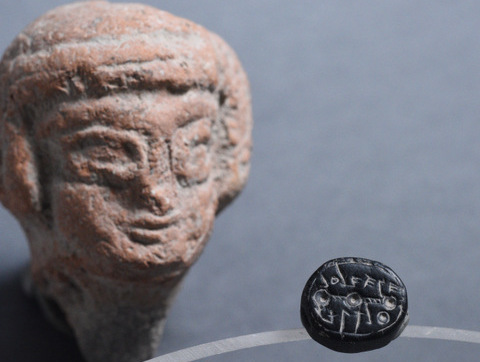It reveals the high status of its owner and confirms the important role of some women during the First Temple period, as described in the book of Proverbs.
 The seal was found during the excavations of Givati, the City of David. /AII
The seal was found during the excavations of Givati, the City of David. /AII
Two seals bearing Hebrew names, dating from the First Temple period, have been uncovered by the Israel Antiquities Authority, during the excavations they are carrying out in the Givati, the City of David, in the Jerusalem Walls National Park.
It is an “exceptional” discovery, because one of the seals bears the name “Elihana bat Gael”, a woman that, according to historians, had purchasing power and important businesses.
The second seal was also in mirror-writing and bears the inscription “to Sa‘aryahu ben Shabenyahu”. The name Sa‘aryahu apparently means “the Lord, which was revealed in a storm” (see Job 38).
“Finding seals that bear names from the time of the First Temple is hardly a commonplace occurrence, and finding a seal that belonged to a woman is an even rarer phenomenon”, said the researchers.
Both seals were found inside a structure built of magnificent ashlars. The archaeologists believe that the well-constructed building was used as an administrative centre.
 The name Elihana does not appear in the Bible. /AII
The name Elihana does not appear in the Bible. /AII
A WOMAN OF HIGH STATUS
According to excavation directors, Dr. Doron Ben-Ami, Yana Tchekhanovets and Salome Cohen: “Personal seals, such as those of Elihana and Sa‘aryahu, were used for signing documents, and were frequently inlaid as part of a ring that was worn by the owner. In antiquity they designated the identity, genealogy and status of the owner of the seal.”
On the woman’s seal, which is made of semi-precious stone, appears the mirror-writing of “to Elihana bat Gael”, inscribed in ancient Hebrew letters. The female owner of the ring is mentioned here together with the name of her father.
Dr. Hagai Misgav of the Hebrew University in Jerusalem explained that “seals that belonged to women represent just a very small proportion of all the seals that have been discovered to date. This is because of the generally inferior economic status of women, apart from extraordinary instances such as this.”
“Indeed, the name Elihana does not appear in the Bible, and there is no other information regarding the identity of the woman, but the fact that she possessed a seal demonstrates her high social status”, Misgav added.
AN INDEPENDENT WOMAN
According to Misgav: “Most of the women’s seal that are known to us bear the name of the father rather than that of the husband. Here, as in other cases, this might indicate the relatively elevated status of Elihana, which depended on her original family, and not on her husband’s family.”
But it seems that “Elihana maintained her right to property and financial independence even after her marriage and therefore her father’s name was retained; however, we do not have sufficient information about the law in Judah during this period”, he affirmed.
 The seal demonstrates her high social status. / AII
The seal demonstrates her high social status. / AIIThe name Eliha is known from a contemporary Ammonite seal and is the feminine form of the name Eli, a very common name in the Bible:
“The script appearing on the seal is remarkably similar to the script on Ammonite seals, and this might indicate the foreign origin of the artisan who carved the seal and possibly the foreign origin of Elihana, who apparently came from east of the Jordan River”, Misgav concluded.
THE ROLE OF WOMEN IN PROVERBS
The chapter 31 of Book of Proverbs states that a woman of "noble character" provides for the needs of her household:
She gets up while it is still night;
she provides food for her family
and portions for her female servants.
She considers a field and buys it;
out of her earnings she plants a vineyard.
She sets about her work vigorously;
her arms are strong for her tasks.
She sees that her trading is profitable,
and her lamp does not go out at night.
(Proverbs 31:15-18, NIV)
An archive of documents preserved in the Judean desert from the time of the Second Temple indicates, among other things, the business of Babatha bat Shimon, a female land owner who had legal status.

Las opiniones vertidas por nuestros colaboradores se realizan a nivel personal, pudiendo coincidir o no con la postura de la dirección de Protestante Digital.
Si quieres comentar o